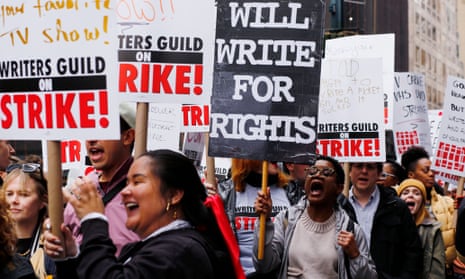On Tuesday, the Writers Guild of America, or WGA, was forced to go on strike. The reason is, as always, economic. The major Hollywood studios have changed their business model from broadcast to streaming. Once we watched our favorite TV shows by satellite dish; now we watch them over the internet. It doesn’t really change the work, however.
The studios are, of course, entitled to change their business model. Their goal is to maximize profits – and they’re doing a great job of it. The resulting change has increased studio profits by 39% over the past 10 years. Yet in that same time period, the average writer’s salary has gone down 4%. The pie has gotten larger, but writers’ share of that pie has significantly decreased. Ultimately, the way screenwriters are compensated for their work needs to be updated: we’re being paid according to the old business model, not the new.
Despite that fact that there seem to be more shows than ever, television writing staffs have decreased in size; so has the average term of employment. Most writers get paid per episode produced. Years ago, if you were writing on a hit show, you’d produce 22 or even 24 episodes a season. Then you’d take a short hiatus and do it again. Today, if you’re on a hit show you’re lucky to produce eight or 10 episodes a season. That’s a big pay cut. If a writer is lucky and the stars align, they might be able to jump to another show. But that is much easier said than done. The reality is, it’s hard enough to get one job per season, much less two.
Sometimes a screenwriter can sell a pilot or a movie on the side, but again, this is a high hurdle to jump. No writer can count on selling a pilot every year, no matter how good they are.
Because of this, it’s becoming harder and harder for writers to sustain a career. In the long term, this will be bad for Hollywood. Career writers are experienced, and generally studios will only trust a show with a multimillion dollar budget to an experienced writer. Experience is how they protect their investment.
For the past several years, it hasn’t been too difficult for studios to find those experienced writers. As it becomes more and more difficult for screenwriters to sustain a living, however, these creative people will be forced to leave the business to pursue more lucrative vocations. The talent pool will dry up, which will ultimately hurt the quality of shows produced. I don’t think the studios are considering the long-term impact of such a decision.
Most of us don’t become screenwriters for the money. We do it for the joy of living a creative life, and it’s not wealth that attracts us to this profession. But joy only takes you so far when you’re trying to provide for your family. We’re OK playing the role of the “starving artist” before we break in, but what seems romantic when you’re 25 is less romantic when you’re older and have mouths to feed.
Every three years, the contract between the WGA and the studios – known as the basic agreement, or MBA – is up for ratification. Several months ago, the WGA surveyed its membership about their concerns, then had members vote on a “pattern of demands”. Over 98% of the membership agreed on the issues that most affected them. The fact that 98% of the membership agreed speaks volumes. You can’t get 98% of people to agree that the Earth is round.
The WGA brought these issues to the negotiating table; unfortunately, little progress was made, and a strike was called. No one wants to strike. This will put hardship on everyone in the industry, from caterers to crew members to actors and directors. These are our colleagues and friends, and no one wants them to suffer.
The livelihood of all writers is at stake, however. We take great satisfaction from our jobs and want to continue creating the stories that everyone loves – but we need to be able to make a living.
Even though the word “strike” has combative connotations, this contract dispute will, ultimately, be resolved peacefully. It’ll look like several thousand nerdy writers, carrying picket signs, walking in circles. It doesn’t get more peaceful than that.
The people we’re picketing are our employers. We like them and we want to work for them. We have the same goal. They want to make a lot of money, and we want to be the people that make them that money. We just need a fair deal to make that happen.
Michael Jamin is a television writer and showrunner who has worked on King of the Hill, Beavis and Butt-Head, Maron, Just Shoot Me and many other series
